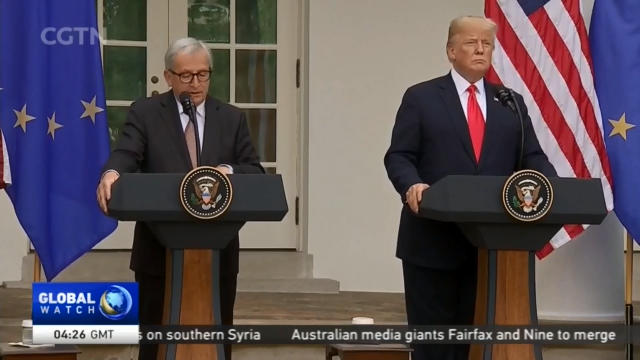
13:27, 26-Jul-2018
US-EU Trade Talks: President Trump & EU chief Juncker agree to work toward lowering tariffs
Updated
13:07, 29-Jul-2018
02:43

Trade issues between the United States and the European Union remain complicated. To avoid a trade war, President Donald Trump and head of European Commission Jean-Claude Juncker held talks in Washington. So what did they agree on? CGTN's Nathan King has more from the White House.
The United States and the European Union step back from the brink of a trade war.
JEAN-CLAUDE JUNCKER PRESIDENT, EUROPEAN COMMISSION "When I was invited by the president to the White House, I had one intention. I had the intention to make a deal today. And, we made a deal today."
DONALD TRUMP US PRESIDENT "This is why we agreed today, first of all, to work together toward zero tariffs. We will also work to reduce barriers and increase trade in services, chemicals, pharmaceuticals, medical products, as well as soybeans. Soybeans is a big deal."
In addition to soybeans, the EU committed to buying more liquified natural gas from the U.S. - a deal similar to the one the U.S. walked away from with China just a couple of months ago.
But for now, the U.S. threat of higher tariffs on European imports of cars is on hold. Juncker said as long as the talks continue the two sides would not impose more tariffs and will "reassess" existing ones on steel and aluminum.
Many details have yet to be negotiated on lowering tariffs on industrial goods, and other products, but from the U.S. - a commitment to stay in the international trading system and work to reform the World Trade Organization - something the EU and Beijing also recently agreed to do.
DONALD TRUMP US PRESIDENT "We will, therefore, work closely together with the like-minded partners to reform the WTO and address unfair trading practices, including intellectual property theft, forced technology transfer, industrial subsidies, distortions created by state-owned enterprises, and overcapacity."
For Trump this is a political victory, especially when it comes to soybeans. He has faced intense criticism at home from farmers - a traditional base of support. He even announced a 12 billion dollar bailout for farmers who are feeling the effects of tariffs.
NATHAN KING WASHINGTON "While this is not a done deal it's a welcome de-escalation in the tit for tat tariffs between Washington and Brussels. The question now is, facing political pressure at home, will the U.S. President consider similar compromises with his neighbors Canada and Mexico, and biggest trading partner China. Nathan King, CGTN, at the White House."

SITEMAP
Copyright © 2018 CGTN. Beijing ICP prepared NO.16065310-3
Copyright © 2018 CGTN. Beijing ICP prepared NO.16065310-3